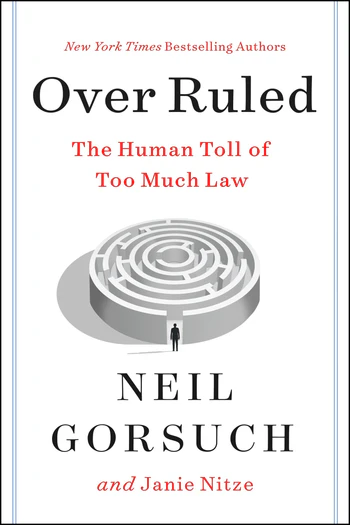In ‘Over Ruled,’ Justice Gorsuch Tells of the Folly of the Administrative State
A new book from the constitutionalist from Colorado illuminates the dangers of administrative power and overregulation.

‘Over Ruled: the Human Toll of Too Much Law’
By Neil Gorsuch and Janie Nitze
Harper, 304 pages
Books by Supreme Court justices usually focus on constitutional doctrine—on judicial interpretations of the Constitution. “Over Ruled: The Human Toll of Too Much Law” is, therefore, a pleasant surprise. Justice Neil Gorsuch and his former clerk Janie Nitze prioritize not legal analysis, but a series of stories about unfortunate litigants, whose experiences illuminate the dangers of administrative power and overregulation.
Most accounts of contemporary American regulation (including my own books) suffer from undue abstraction. They don’t provide enough concrete examples of how our current misrule destroys lives and livelihoods. They therefore leave readers without a visceral feel for how we are governed. Justice Gorsuch and Ms. Nitze recognize this gap and fill it with narratives, both sobering and entertaining.
We learn about individuals whose businesses were defeated, whose lives were destroyed, even one who was driven to suicide by arbitrary, unjust, and downright cruel regulation. Tragedy often intersects with comedy, as when the authors tell of an entertainer who kept a pet rabbit for his magic performances, only to find that he needed a federal license to keep a rabbit.
The Hemingway Museum at Key West faced the same problem because of its six-toed cats. When the museum finally applied for a license, the Department of Agriculture was not satisfied and had undercover federal agents conduct surreptitious surveillance of the cats to determine whether they were receiving the department’s standards of care. Kafka would have been proud.
The storytelling enables readers to get past the complexity of the contemporary regulatory regime and sense the underlying human stakes. Whereas the constitution provides a single system of federal lawmaking and a single judicial system, the federal administrative state consists of myriad other legislative and judicial bodies. Administrative power therefore often defies popular and even academic understanding. To get past this obstacle, the justice and his clerk tell regulatory stories.

I’ll add one of my own. When I was writing my book ”Is Administrative Law and Unlawful?” I struggled to figure out the range of different in-house judicial processes employed by different agencies. Academic scholarship was not very helpful, so I consulted a noted colleague and one of the nation’s leading administrative scholars. If anyone would know, it would be him.
My colleague’s response was telling. He could explain the judicial process employed by the agency for which he once worked, but when I pressed him for information about the vast number of other agencies, he had nothing to say—except that one has to work for an agency to understand its processes. So much for transparency!
Justice Gorsuch and Ms. Nitzi summarize: “Law is multiplying, and its demands are growing increasingly complex. So much so that ordinary people are often caught by surprise, even seasoned lawyers, lawmakers, and (yes) judges sometimes struggle to make sense of it all.” An increasingly complex world may require complex rules. The authors, though, rightly consider that no excuse for the unnecessary complexity and injustice of contemporary governance.
This isn’t just a question of liberty and due process — it’s also an equality problem. Justice Gorsuch and Ms. Nitzi write that “When law expands rapidly in size and complexity, when important rules can change (change back again) with ease and little warning, when important guidance can sometimes be found only in an official’s desk drawer, who are the winners and losers?”
Justice Gorsuch and Ms. Nitzi answer that “In one sense everyone may suffer. But who suffers the most? . . . . [S]mall and less powerful groups like the Amish often have a harder time making their case, and new rules can represent to them not just an expense or a hassle but an existential crisis.”
Justice Gorsuch and Ms. Nitzi recount the scandalous prejudice of the granddaddy of federal administrative power, President Wilson, who privately complained that “universal suffrage is at the foundation of every evil in this country” and publicly protested against the difficulty of understanding and changing the minds “of Irishmen, of Germans, of negroes.” Such were Wilson’s driving reasons for establishing administrative power.
Even without Wilson’s grotesque prejudices, administrative rulemaking reserves power to unelected educated elites and thereby dilutes voting rights. At stake, therefore, is not merely economic freedom, nor just the separation of powers, but our most fundamental civil liberties.
“Over Ruled” addresses such dangers with a light touch. Its goal seems not to polemically persuade, but to open up questions for Americans to ponder and reconsider. If the authors can induce Americans to pay more attention to these problems, perhaps popular concern will circle back to some of Justice Gorsuch’s colleagues on the bench.
